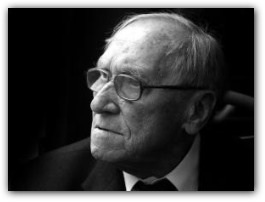 In one of his essays from half a century ago included in Is God Happy?, the Polish philosopher Leszek Kolakowski examined how Jesus shaped the history of Western culture — not as a theological, mythologist or psychologist — but simply as a layman seeing how the words of Jesus made us who we are today in many respect. Kolakowski was a world-renowned thinker who was expelled from Poland in 1968 by the Communists when he became a research fellow at All Soul’s College in Oxford. He lists five legacies of Jesus in the essay, rooted in essentially world-changing sentences from the New Testament in a section titled “Jesus for Us”:
In one of his essays from half a century ago included in Is God Happy?, the Polish philosopher Leszek Kolakowski examined how Jesus shaped the history of Western culture — not as a theological, mythologist or psychologist — but simply as a layman seeing how the words of Jesus made us who we are today in many respect. Kolakowski was a world-renowned thinker who was expelled from Poland in 1968 by the Communists when he became a research fellow at All Soul’s College in Oxford. He lists five legacies of Jesus in the essay, rooted in essentially world-changing sentences from the New Testament in a section titled “Jesus for Us”:
- Abolishing law in favor of love. Kolakowski loathed the way Marxism had emerged as a political reality in the world, but he favored an ethic of sharing, a world based on trust and compassion rather than contractual obligations and the accumulation of property. “All utopias of universal brotherhood flower from the same root, however indifferent they may be to their remote origin.” The notion of universal health care derives from that root.
- The hope of eliminating violence. As much as violence is still alive in the world in practice, it is shunned by civilized leadership. Note how Gandhi and Martin Luther King led peaceful social transformations — something close to orderly revolutions — without resorting to weapons or violence. It’s a possibility Jesus introduced into Western culture by his example and sacrifice — a sacrifice echoed in the lives of both Gandhi and Martin Luther King. “Until quite recently, heads of state did not hesitate to announce expansion by war and conquest; but such announcements are now rare. The idea of world without violence has been accepted (as the ideal). This being so, the hope for a world without violence is not a ludicrous fancy.”
- Man shall not live by bread alone. Most of our higher aspirations derive from this simple statement: that we believe we can be more than mere physical survival machines. Whether it’s true or not, the behavior inspired by that conviction has lifted us into a world that values more than power and might. “For centuries people have battled for the recognition of values that are not reducible to physical needs. Everything Jesus preached, if it has endured in our culture, comes to seem banal– and it is thanks to him that it has become so.”
- The abolition of a chosen people. “The idea that fundamental human values are the common property of all, and that humanity is one people — have become an inalienable part of our spiritual world.” And a cornerstone of the classic liberalism that gave birth to American and European culture.
- The “wretchedness of the world.” I had direct experience of human wretchedness as a child in a Romanian work camp. Human nature has a long way before we evolve beyond our survival impulses, and that is precisely what Jesus offered: a vision of a leap toward a new way of being in the world. “One can try to change for the better all that can be changed in the conditions of human existence, one can battle for it relentlessly…” It’s a vision Jesus introduced into Western culture by his example and sacrifice.
As this Polish thinker sums up in his essay: “Jesus was not just a teacher but the model of the highest human values.” And even atheists can agree on his conclusion and take heart from the example of this Jewish prophet: “He incarnated the ability to express one’s own truth fully and loudly, to defend it to the end with no evasion, and to resist to the end the pressure of the established reality which rejected him.”
As he says earlier in the piece, Jesus appears to us, 2,000 years later, as a real human being who makes us aware of the darkness we inhabit and shows a way out of it. With the advance of civilization since his life on earth, an advance guided by his example, we’re part of the way toward his vision of a peaceful world. But we have a ways to go, don’t we? As I reflect on the thinking and wisdom of Kolakowski’s words, I am flooded by the hope that we can achieve our ultimate potential as a species — a feeling of hope and joy.